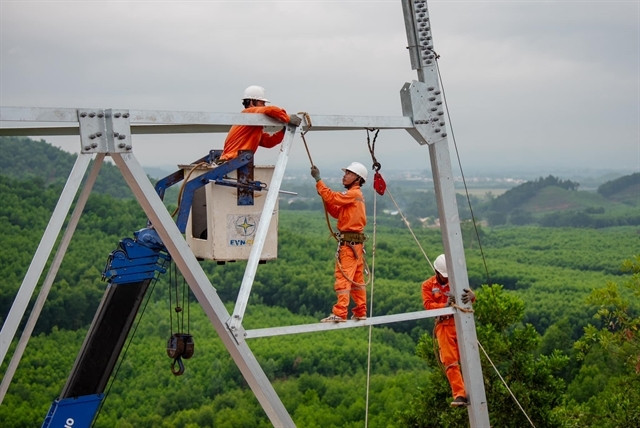 |
| EVN workers are installiing power grids. — Photo courtesy of EVN |
While the market benchmark generally stayed bullish over the past two months, electricity stocks, seen as a defensive sector, have experienced downturn.
This can be partly attributed to weaker-than-expected second quarter results for coal and gas-fired power companies, as input costs eroded profits despite higher electricity demand.
The renewable energy group has seen support from the new direct power purchase agreement (DPPA) mechanism, but challenges in implementation and an investigation into 32 wind and solar projects have put pressure on those stocks.
Hydropower firms have returned to the competitive market, garnering more attention due to its cost-effectiveness.
However, stock prices have only modestly reflected the improved production and lower costs, with only a handful of stocks like Thác Mơ Hydro Power (TMP) and those in Refrigeration Electrical Engineering Corporation (REE) ticking up slightly.
The price movements of Việt Nam's electricity stocks not only go against the domestic market trend, but also against the rising trend of power shares in the region.
Across many Asian stock markets, utility stocks have been attracting investor attention due to growing electricity demand and the need for major investments in power generation and grid infrastructure in recent years, to support the energy transition.
According to Bloomberg, the MSCI Asia-Pacific Utilities Index, which tracks stocks of leading electricity companies in the region, has climbed 14 per cent since the start of 2024 and is heading for its strongest annual gain since 2006.
Notably, stocks of State-owned utility NTPC (India), Power Grid Corporation of India (India) and Kansai Electric Power Co. (Japan) have seen around 30 per cent gains, while YTL Corp (Malaysia), Torrent Power (India) and CGN Power Co. (China) have surged over 50 per cent.
Long-term positive outlook
Anticipating a 6 - 6.5 per cent GDP growth in 2024, electricity consumption is set to surge, driven by a recovering real estate market and industrial sector. Vietnam Electricity (EVN) aims to reach a total system electricity output of 306.4 billion kWh, a nine per cent increase from last year.
MB Securities JSC (MBS) expects a 9.8 per cent rise in electricity demand for 2024 compared to 2023, aligning with the positive scenario in National Power Development Plan VIII. The growth is fuelled by a stronger-than-expected electricity production increase, averaging 13 per cent in the early months.
Looking ahead to 2025 - 2030, MBS estimates a robust annual compound growth rate of 9.3 per cent in electricity demand, mirroring the economic recovery post-2020 to 2023. It is primarily due to the resurgence of industrial production and rising consumer demand during the hotter months.
Consequently, there is a need to expand the electricity transmission system in the long term, particularly as it struggles to accommodate the growing renewable energy capacity and the demand for increased power supply from the south to the north.
Meanwhile, constructing new power sources is seen as a key pillar for economic growth.
As outlined in the Power Development Plan VIII, significant capital and workload are allocated for construction activities (infrastructure and power sources) until 2030.
MBS believes this will ensure job stability and support long-term growth prospects, especially for firms like PC1 Group and Power Engineering Consulting JSC 2 (PECC2), known for handling large-scale and high-tech projects.
In the power sector, PECC2 has been highlighted as a promising investment due to its potential for sustained growth, according an investment fund member.
Despite the absence of momentum from the Sông Hậu 2 project, PECC2's prospects remain strong. The company has recently secured a consulting contract for the Ô Môn III Thermal Power Plant project, indicating further opportunities for growth.
Vietcombank Securities rates PC1 as a potential stock in the electricity group, expecting revenue growth in the latter half of 2024. Hydroelectric power stands to benefit from the return of La Niña, alongside optimistic prospects in construction and mining revenue and profits from joint ventures and partnerships. — VNS